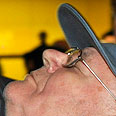Poland said Friday it had filed protests over foreign media's use of the term "Polish camp" for the Sobibor death camp set up by Nazi Germany in the occupied country during World War II.
Foreign ministry spokesman Piotr Paszkowski told AFP that Warsaw objected to the wording in reports on the trial in Germany of Ukrainian-born John Demjanjuk, 89, accused of helping as a guard to murder 27,900 people at the camp in 1943.
Demjanjuk Trial
Sarah Stricker
Prosecution attorney, Cornelius Nestler, not thrown off by defense's arguments, promises to serve letter of law with alleged Sobibor Nazi guard. 'He needs to grapple with his deeds for the rest of his life,' he says
"The Polish embassy in Madrid has intervened following the use of the expression 'Polish concentration camp' by several Spanish media," Paszkowski said.
Warsaw singled out the newspapers El Pais, El Mundo, the television channel TV1 and the radio station Cadena Ser. It noted that they had issued immediate corrections after being taken to task
The Polish embassy in Paris, meanwhile, sent protest letters to the television channels France 24, LCI and Euronews, the radio station France Info, the newspaper Le Figaro and the weekly magazine L'Express.
The term had also been used by German media, including the public television channel ZDF, which also issued a correction and said it regretted its mistake.
The majority of the six million Jews who perished during the Holocaust were murdered in death camps set up and entirely controlled by Germany in occupied Poland, including Sobibor and the notorious Auschwitz-Birkenau.
Warsaw watches like a hawk for descriptions of such camps as "Polish" -- it has also slammed British and US media in the past -- because it says the term implies that Poland bore responsibility for the Holocaust.
Poland was home to Europe's largest pre-war Jewish population, some 3.5 million people. Polish Jews represented around half the Nazis' victims.
"We have spoken out more than 700 times, with a positive result in the majority of cases. Editors have published corrections and educated their journalists. It seems that in the long term our efforts have been successful and that the term is being used less and less," Paszkowski told AFP.

Demjanjuk on trial in Munich
Photo: AFP
מומלצים















